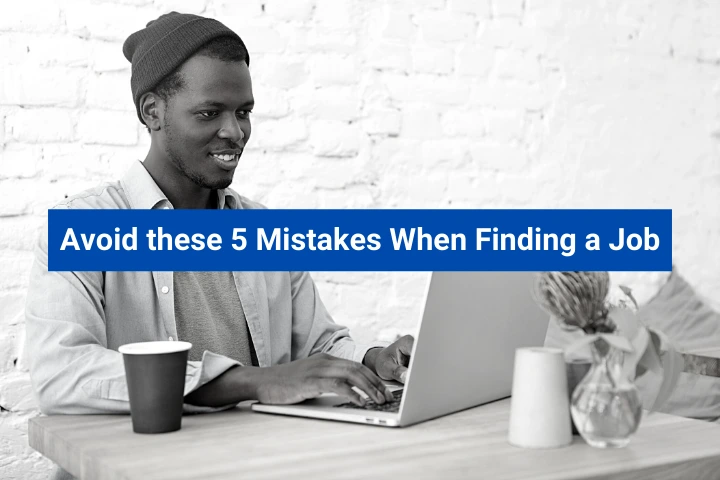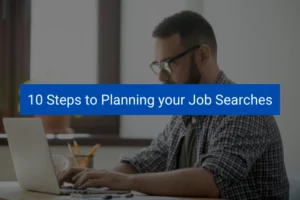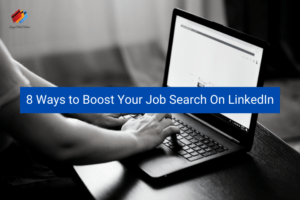In their job search, job seekers frequently make basic blunders that are perfectly avoidable. Even the most skilled employees, ironically, make these errors because they lack recent experience hunting for a new job. Unemployment has reached its greatest level in decades as a result of the recession and company downsizing. The competition is fierce, and companies have the upper hand in selecting the best individuals from an ever-growing pool of applicants. Avoid these five common blunders to increase your chances of success in job finding:

1. Relying on Online Strategies
For job searchers and employers, online job finding and networking organizations have become the new norm. This does not, however, imply that you should devote all of your time to applying for employment online. The one alternative you should avoid is submitting an online application.
Many organizations are using applicant tracking systems (ATS) to save time combing through the hundreds of resumes they receive. Most applications end up in the virtual garbage because job seekers aren't aware of robot-friendly keywords or layouts. (This is why you've been receiving automated rejection emails.)
10 Toughest Questions to Expect in a Job Interview Click Here>>>
Make it more personal if possible.
Instead of pressing the "submit" button, do some research on the individual who posted the position. Look through your contacts for possible recommendations. Even obtaining an email address associated with a human is preferable to going online. The same is true when it comes to networking. Despite the fact that online forums have "simplified" networking, human interactions and contacts are still more successful. Don't overlook face-to-face networking opportunities.
2. Underestimating LinkedIn
With the arrival of LinkedIn, the internet landscape has complicated the application process but also served to help job seekers. LinkedIn is the place to be because it has so many benefits for everyone, regardless of their profession, level, objective, or current job hunt status (even non-job seekers need to have an optimized profile). This is the largest talent database for job searchers, which translates to "where 100% of recruiters and hiring managers go to discover their next employee." LinkedIn is crucial for non-job seekers since it helps them to be found for chances you would not expect. LinkedIn is also a useful tool for studying organizations and career prospects, as well as keeping track of your professional network. You don't have to be a member of every social media platform, but believe me when I say that you should be on LinkedIn.
How to Use LinkedIn for Business Marketing in 2021? Click Here>>>
3. Not Communicating Your Brand
When job seekers approach me, professional brand strategy is arguably the most important area for improvement. Many job seekers consider a CV, cover letter, or LinkedIn page to be their work history, and they use each application to promote a fairly conventional, bland brand. Your application documents, on the other hand, should be considered as marketing pieces that portray you in the most favorable light for your reader. Because the job market is competitive, it's vital to take the time to carefully design the ideal message for each application.
Consider your profile from the perspective of a hiring manager.
Consider your CV to be valuable marketing real estate, and include only the information that is required and compelling for each application. Add a short headline to quickly summarise what you do, and always direct your reader to the information that is most relevant to his or her needs.
How to Give a Professional Touch to your CV? Click Here>>>
4. Overlooking Job Descriptions
In many ways, the hiring manager's needs, as described in the job description, drive the creation of a great brand. It's not enough to find a job that's a perfect match for you and think the reader will see the same thing. You must match your brand to the job description, which requires a thorough understanding of the company's needs. Every job description is distinct, and each CV you submit should be as well. Make a list of keywords and talents from the job description and include them in your resume. One message should be communicated: "I am the solution to the problem you need to be solved."
5. Starting Too Late
Many individuals believe that looking for work is a quick process, yet it might take up to six months. Even if you have a few years until your next job hunt, never be hesitant to test the market or throw your hat in the ring when an opportunity arises. The worst-case scenario is that an interested employer refuses to hire you until you're ready. The benefit is that you can test your brand against your target role, practice interviewing, take a bigger risk when negotiating with interested parties, and maybe land a better job.
10 Interview Mistakes to Avoid Click Here>>>
If you're currently looking for work, avoid these five typical blunders to boost your chances of landing a job. They are simple to avoid and can help you find a new job faster by making your search more productive. If you're not sure how to solve some of these issues, talk to a job coach or another professional. If you can get recruited faster and return to the workforce with a demanding new job, the investment you make in coaching support should pay for itself.
For Human Resource, Payroll and many more HR Services, visit our website https://lingueeglobal.com/



